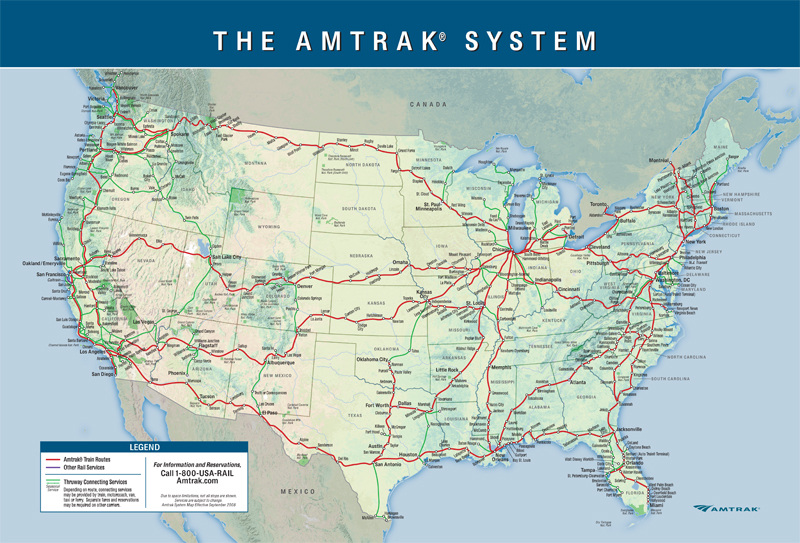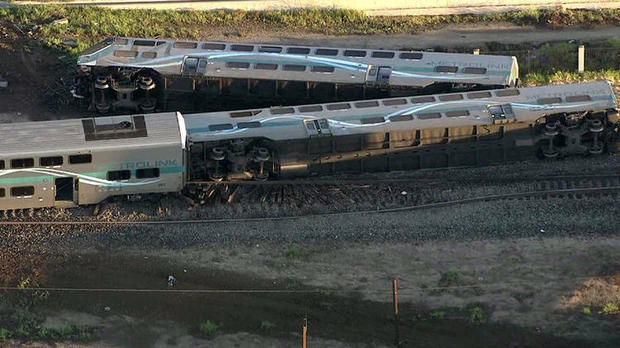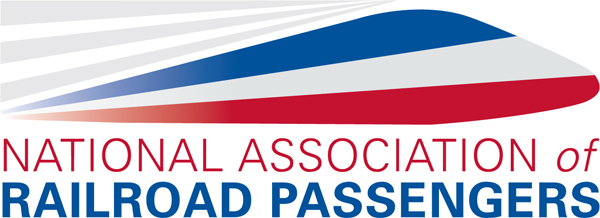Hotline #900
February 27, 2015

Earlier this week, NARP discovered that the House is scheduled to vote on the passenger train authorization bill on Tuesday, with a number of anti-Amtrak amendments to be considered.
Act now to ask your elected representative to support passenger trains and vote “NO” on the anti-Amtrak amendments!
Below, NARP has reproduced a full list of the amendments to the Passenger Rail Reform and Investment Act of 2015 (H.R. 749) submitted to the House Rules Committee before today’s filing deadline. We've provided a brief analysis of the overarching impact these amendments would have:
- Fortunately, there are no amendments that explicitly target the operating budgets of long distance trains. Passengers were forced to rally against many anti-LDR provisions in last summer’s budget fights.
- There are, however, proposals that would negatively impact long distance services. Rep. Paul Gosar (R-AZ) has four amendments targeting various aspects of food & beverage service.
- Rep. Gosar also caps funding levels for the Northeast Corridor at $439 million, PRRIA’s FY 2016 levels. In the bill passed by the House Transportation Committee, those numbers slowly increased over the four authorized years, ultimately reaching $498 million for the NEC.
- Many of the amendments target safety at railroad crossings, responding to two recent grade crossing accidents in New York and California.
- Rep. Bill Posey (R-FL) introduced three amendments indirectly attacking the All Aboard Florida project, which would establish 110 mph passenger service between Orlando and Miami. While the project is privately funded, Rep. Posey responded to NIMBY pressure by throwing up obstacles that would make it harder to secure loans and issue private activity bonds.
- The biggest threat comes from Rep. John Mica (R-FL), who filed an amendment to force private operations on the Northeast Corridor. The proposal would require the Northeast Corridor Infrastructure and Operations Advisory Commission (NEC Commission) to solicit bids for a privately operated express service on the NEC. The express service would mainly achieve time-savings through eliminating stops.
NARP is organizing a call-in day for Tuesday, March 3, where we will ask America’s passengers to tell their representative to vote “NO” on anti-Amtrak amendments. It appears this bill has a good chance of passing, since many pro-rail Members of Congress believe PRRIA 2015 is the “best they can get.” It’s absolutely critical that none of these amendments make it into the final legislation.
But in reality, PRRIA 2015 is a “kick the can down the road”-bill that does nothing to address the huge deficit in investment holding back U.S. infrastructure. That means we must rally in support of real funding. By establishing our position now, we’ll be ready when the Senate drafts their response bill. With dedicated revenue, American’s could finally get the frequent, reliable service we’ve fought so hard for!
Summary of Amendments Submitted to the Rules Committee for H.R. 749
Fitzpatrick (R-PA)
Adds veteran-owned small businesses to the participation study required under Section 305.
Brownley (D-CA)
Requires each state to develop a grade crossing action plan, identifying specific solutions for improving safety at crossings, including highway-rail grade crossing closures or grade separations; and focuses on crossings that have experienced recent grade crossing accidents or multiple accidents, or are at high risk for accidents.
Lowey (D-NY)
Authorizes $10 million for a high-visibility grade crossing safety law enforcement campaign.
McNerney (D-CA)
Ensures that socially and economically disadvantaged businesses request for proposals are considered for station development opportunities under Section 208 of the bill.
Gosar (R-AZ)
Prohibits the use of federal funds to provide alcohol free of charge on a route operated by Amtrak.
Gosar (R-AZ)
Prohibits the use of federal funds to provide food or beverages free of charge to Amtrak employees on the Auto Train or long-distance sleeper cars.
Gosar (R-AZ)
Prohibits the use of federal funds to cover operating losses from food and beverage service after 1 year from enactment.
Gosar (R-AZ)
Requires that the cost of labor for administering food and beverage service be included in the calculation of the total price of food and beverage service.
Gosar (R-AZ)
Keeps consistent the funding authorization to the Northeast Corridor Improvement Fund and the National Network Account at FY 2016 levels through FY 2019.
Posey (R-FL)
Places a $600 Million cap on loans made through the Railroad Rehabilitation & Improvement Financing (RRIF) program.
Posey (R-FL)
Ensures that Environmental Impact Studies are completed before passenger rail projects can sell private activity bonds. Also ensures that the issuer of private activity bonds for passenger rail projects assume primary responsibility for making safety improvements to road and waterway crossings.
Posey (R-FL)
Require a resolution of support for the project from elected representatives in each affected county before funding can proceed.
Perlmutter (D-CO)
Requires the Government Accountability Office (GAO) to submit to Congress a report evaluating the effectiveness of the Federal Railroad Administration's (FRA) 2005 rule on the use of locomotive horns at rail crossings.
Mica (R-FL)
Proposes Northeast Corridor Operation Competition for limited higher speed service.
Lipinski (D-IL)
Clarifies that passengers using or transporting non-motorized transportation are to be considered in the Amtrak Office of Inspector General's report on boarding procedures in Section 211.
The Colorado Senate’s committee on local government passed a bill by a 5 to 2 vote to provide $8.9 million for the continuance of the Southwest Chief.
“I want to thank the bipartisan leadership of state Sens. Leroy Garcia, D-Pueblo, and Larry Crowder, R-Alamosa, for their work on this bill,” Pueblo County Commissioner Sal Pace told The Pueblo Chieftain. “This bill is critically important to Southeastern Colorado, and we are now one step closer to bringing passenger rail to Pueblo.”
The bill would also provide $500,000 in funding for a service improvement study.
Texas State Rep. Will Metcalf (R-Conroe) introduced a house bill targeting electric railways, an attack on the privately-funded Texas Central Railroad (TCR) project to connect Houston and Dallas with modern passenger train service.
The legislation, HB 1889, would require electrified railroad projects to secure the blessing of each county it runs through before they could secure land for the right of way. The fact that the bill is targeted at electrified railroads—and not at road or highway projects—is a clear shot at TCR, a privately funded passenger rail project.
The bill has already drawn vocal opposition from many Texans.
“[S]uch a bill would also render any long-distance ventures nearly impossible. Dozens of counties would need to sanction a single project, but the opposition of only one municipality could derail the entire plan,” wrote The Star-Telegram’s editorial board. The paper went on to write that the “residents of all counties impacted by the railway have a right to ask questions, make recommendations and voice their concerns. But passing a bill that would allow a single county to thwart the entire project is just bad policy.”

Image via the Los Angeles Times.
A Metrolink commuter train derailed after colliding with a truck parked across a railroad crossing on February 24, injuring around two dozen passengers.
The accident took place early Tuesday morning when a Ford F-150 pickup, which had been driving along a road parallel to the tracks, parked across the right of way. Investigators are still attempting to determine why the truck’s driver, Jose Alejandro Sanchez-Ramirez, fled from the truck; he was found 1.5 miles from the scene of the accident. The resulting collision led to the derailment of three rail cars, which slid sideways across the ground injuring 28 people, three of them critically. It’s still unclear if the Metrolink engineer will survive.
However, Metrolink officials stated that recently introduced crash energy management technology prevented more serious injuries—and likely saved lives. The newly acquired rail cars include crumple zones to absorb impact forces, and feature improved emergency access and egress via upgraded windows.
"We can safely say that the technology worked," Metrolink spokesman Jeff Lustgarten told reporters. "It minimized the impact of what (could have been) a very serious collision. It would have been much worse without it."
Federal regulators are currently investigating the incident.
"We are very concerned about grade crossings, and we intend to use this accident and others (like a deadly one in New York earlier this month) to learn from it to keep it from happening again," said National Transportation Safety Board spokesperson Robert Sumwalt.
After a long period of decline, grade crossing incidents are on the rise again--in large part because of the increase in freight rail traffic that has attended the economic recovery.
All Aboard Ohio explored the major delays and cancelations that have been afflicting Midwest train passengers in an in-depth piece posted this week to their website.
The advocacy group looked at the recent performance of Amtrak’s Lake Shore Limited and Cardinal. In one instance, they found Train No. 48 departed five hours and 47 minutes late.
“This is downright offensive to the traveling public,” said All Aboard Ohio Executive Director Ken Prendergast. “…It is clear by their poor performance that these trains are being neglected by Amtrak and its private-sector partners who own and manage the tracks. Rail transportation used to be largely indifferent to bad winter weather. Nowadays, the railroads can’t seem to get their trains through the snow and cold.”
“Some of the reasons for the delays include those beyond Amtrak’s control, including speed restrictions as low as 25 mph on tracks owned by CSX and Norfolk Southern (NS) who fear the cold will crack their seamless welded steel rails,” All Aboard Ohio continued. “But other delays are Amtrak’s responsibility, namely equipment malfunctions. Locomotives have failed en-route while doors between rail cars freeze open, dropping temperatures inside for passengers and causing toilets, pipes and water tanks to freeze and rupture.”
The Vermont Rail Action Network is reporting that Vermont Governor Peter Shumlin has identified $35 million for passenger rail in his annual budget proposal, out of a total transportation budget of $630 million.
VRAN provided an excellent analysis of the bill, which adheres closely to federally-identified transportation priorities:
"Of the total budget, VTrans estimates 24 million will be spent on construction projects, with an additional 1.5 million spent on engineering. 7.7 million will be spent on subsidizing Amtrak service in the state and the remaining funds for bridge inspection, administration and other projects.
"The largest amount will be spent on the “Western Corridor” between Bennington, Rutland and Burlington. Governor Shumlin has made a commitment to extend intercity passenger service to downtown Burlington by 2017.
"19 million will be spent on upgrading the western corridor between Bennington and Rutland and also between Rutland and Burlington. This project includes 5.8 million in funds left from the last TIGER grant and 7.7 million remaining of the Jeffords Earmark. This plan will include bridge and crossing upgrades and new rail between Rutland and Leicester Junction."
The California High-Speed Rail Authority is currently engaged in preliminary construction work along the San Joaquin River outside of Fresno, moving closer to the much anticipated laying of the initial track segment.
In a release, CAHSRA outlined the objective of the work, called statnamic testing:
“The purpose of this test is to assess the load-carrying capacity of the foundations needed for the bridge that will be constructed over the San Joaquin River to provide a dedicated crossing for high-speed rail trains.
…
“This work is being done within the first 29-mile stretch of the high-speed rail project – known as Construction Package 1 – that goes from Avenue 17 in Madera to East American Avenue in Fresno. This is where construction work on the project is ongoing, and it’s where the official groundbreaking ceremony for high-speed rail was held on January 6 in Downtown Fresno at the future station location.”
News in Brief
Amtrak trains were canceled on February 26 throughout the Southeast due to extreme winter conditions.
That includes NEC trains between Norfolk and Richmond, Virginia; NEC trains between Newport News, Virginia and the District of Columbia; and the Palmetto between New York City and Savannah, Georgia.
